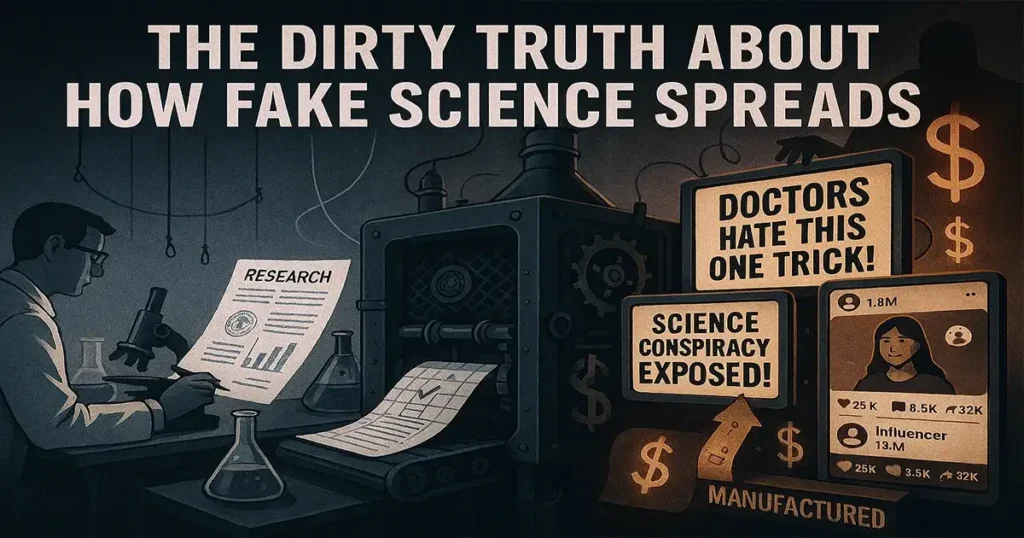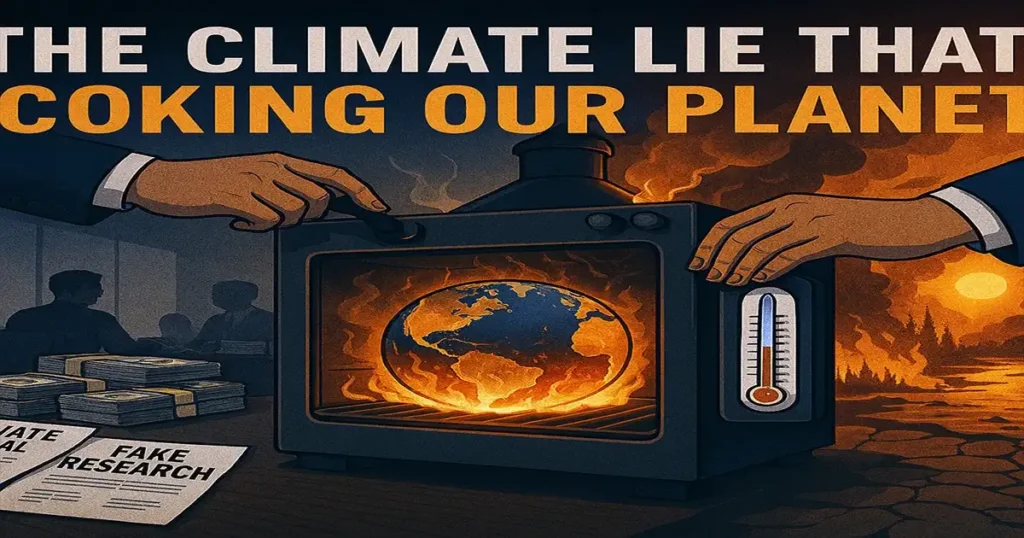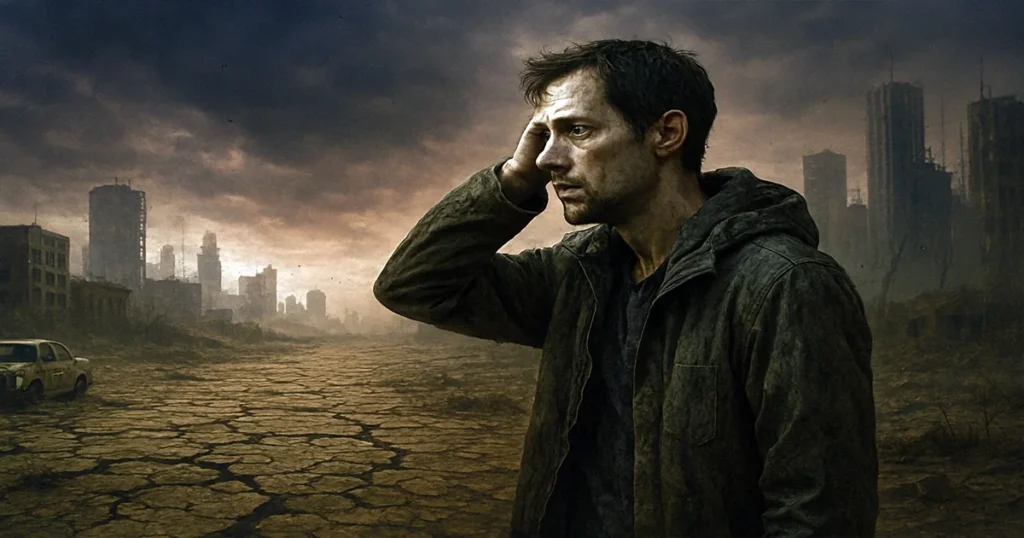I’ll be honest with you—I never thought I’d be writing about why people don’t trust scientists anymore. But here we are in 2025, and frankly, it’s getting scary out there.
The problem isn’t just that people disagree with research findings. It is that we are in the midst of what some health professionals have termed an infodemic, in which a near-majority of Americans is concerned about misinformation to a greater degree than climate change and infectious disease. Strength that in your pipe and smoke it. We are concerned about false news more than real disasters on the planet.
It is this, though, which brings me to this point: we are busy arguing when to vaccinate and whether to wait and see about climate change, but the hoaxers who perpetuate such lies continue to get richer and powerful in doing so. In the meantime, we are all drowning in a mountain of conspiracy theories and half-baked plans perpetuated over YouTubereeks of conspiracy theories.
So enough of the bull. This is what is happening, and you can do something about it.
The Dirty Truth About How Fake Science Spreads
It’s Not Just About Being Wrong—It’s About Being Manipulated
You know what shocked me most when I started digging into this? The machinery behind the spreading of unscientific information is not the creation of some lone basement crank. We’re dealing with structured networks that comprehend psychology, social media platforms‘ algorithms, and human actions better compared to most marketing businesses.

The unit spread out across spinning virtual machines. Do you know your kids have health issues? They hold a natural cure Big Pharma does not want you to know about. Worried about Government overreach? Here’s why official health guidelines are actually about control, not safety.
The Emotional Hook Strategy
This is how it works: Scientific truth is many times complex, nuanced, and dare I say it, boring. A research paper that indicates moderate evidence behind a correlation between X and Y may state that the correlation requires investigation.
In the interim, there is the misinformation variant: X CAUSES Y, Scientists ADMIT (They Have been Lying to You!).
Which will you prefer to click and share? Yeah, exactly.
Why Your Brain Is Wired to Believe Fake Science
I hate to break it to you, but your brain is designed to fall for this stuff. We evolved to make quick decisions based on incomplete information, great for avoiding saber-toothed tigers, terrible for evaluating complex research studies.
The Confirmation Bias Trap
We fairly instinctively go in search of information that validates what we already know. If you’re already suspicious of pharmaceutical companies (and honestly, who isn’t sometimes?), you’re primed to believe stories about how they’re hiding miracle cures.
The Dunning-Kruger Effect in Action
The poorer the information is about a scientific topic, the more secure one is in their views concerning the topic. That is why your high school dropout neighbor in chemistry feels entitled to invalidate fifty years of climate science on account of a Facebook meme.
Real-World Damage: When Fake Science Kills
Here is a story that will make your blood boil. Early in the COVID-19 pandemic, I had a friend, a decent human being, intelligent, college-educated, who started retweeting things on how hydroxychloroquine was being suppressed as a cure.
“Why wouldn’t they want us to have this?” he asked me. It’s because they can’t profit from it.
Six months later, his father died of COVID-19. He’d refused the vaccine and instead tried treating himself with livestock dewormer he bought online.
This isn’t just about abstract “trust in institutions.” People are dying because misleading claims from credible sources can be more damaging than blatant falsehoods.
The Health Crisis Nobody Talks About
The World Health Organization didn’t just casually add misinformation to their list of global health threats—they put it in the top 10. Here’s why that should terrify you:
- Vaccine-preventable diseases are coming back. Measles outbreaks in communities with low vaccination rates. Whooping cough in areas where people believe it’s “natural” to let kids develop immunity on their own.
- Cancer patients are abandoning treatment. Social media influencers with zero medical training convince people that chemotherapy is poison and that turmeric can cure stage 4 tumors.
- Mental health stigma is reinforcing itself. Online communities that treat depression and anxiety as “spiritual awakening” or “toxic masculinity” are killing people who need professional help.
The Climate Lie That’s Cooking Our Planet
I’m gonna get political for a minute here, because this is too important not to.
Climate change denial isn’t just scientific illiteracy; it’s one of the most successful disinformation campaigns in human history. And it’s not even that complicated once you understand the playbook.

The Tobacco Playbook, Version 2.0
Remember how tobacco companies spent decades funding studies that “questioned” the link between smoking and cancer? Same strategy, different industry.
Oil cos knew of climate change in the 1970s. Their scientists confirmed it. But instead of adapting their business model, they spent billions creating doubt about their research.
The genius part? They didn’t have to prove climate change was fake. They just had to make it seem controversial. “There’s still debate among scientists” was enough to paralyze policy-making for decades.
Why Your Uncle Still Thinks It’s a Hoax
Here’s what the climate denial machine figured out: people don’t evaluate scientific evidence; they evaluate which “team” they want to be on.
Make environmentalism seem like liberal elitism? Now, all of a sudden, taking care of the planet is a political identity issue, not a science issue.
Convince people that climate action means economic hardship? Now they have to choose between their paycheck and some abstract future problem.
Frame scientists as part of a global conspiracy? Perfect, now distrust becomes a virtue instead of ignorance.
How to Spot Bullshit Science (A Practical Guide)
All right, enough of the bad. Let’s talk about solutions. After years of studying this stuff, I’ve developed what I call the “Smell Test” for scientific claims.
Red Flag #1: The Miracle Cure Story
This is not how real science works: “One stupid trick your doctors do not want you to know!” or Eureka remedy cures all!
Real innovations in the medical field are not achieved overnight; they require years of experimentation, peer reviews, and replications. When an individual states he or she has found the easy cure that the powers to be do not want anyone to know, escape.
Red Flag #2: The Perfect Villain
Legitimate science acknowledges complexity. If someone is trying to persuade you that the root of all problems is in one place—Big Pharma, government scientists, academic elites—that is ideology rather than evidence.
Messy, cluttered relations between cause and effect can be seen in actual studies. Simple explanations for complex problems are almost always wrong.
Red Flag #3: The Credentials Game
A person acquires a degree with a PhD title, not a doctorate in everything. It is like a baseball player lecturing on tennis, or a physicist speaking on the safety of vaccines, or a psychologist on the false science of climate. He may be an athlete, but the field is too big.
Look for:
- Admission to the designed journals with a peer review
- Research conducted at legitimate institutions
- Consensus among actual experts in the specific field
Red Flag #4: The Emotional Manipulation
Good science informs you. Bad science wants to anger, frighten, or make you superior to other people.
When you read an article, and you feel like you learned some profound information that makes you smarter than others, take a step back. Humility is normally brought about by experience, not arrogance.
Building Your BS Detector
Here’s my toolkit for evaluating scientific claims. I have been using this for years, and it has saved me from humiliation many times!
The Source Check
Before I believe anything, I ask:
- Who funded this research?
- Where was it published?
- What do other professional people, or experts in the field, say about it?
- Do the researchers possess the capacity in this particular field?
The Replication Test
One study proves nothing. Science is concerned with trends within several studies, led by different groups, and carried out in various ways.
Then, when one points to one study as absolute evidence of something, that person just does not know how science works.
The Motivations Analysis
Always ask: Who benefits if I believe this?
- Is someone selling supplements based on this “research“?
- Does believing this make me feel special or superior?
- Am I being asked to distrust entire institutions without offering better alternatives?
What Works: Fighting Back Effectively
Here’s where most people get it wrong. They think fighting misinformation means correcting every false claim with facts and logic. That doesn’t work, and research proves it.
Strategy #1: Build Trust Before Building Knowledge
People don’t reject science because they lack information. They deny it since they do not believe directly in the source.
Rather than yelling at climate contrarians about climate change, environmental activists are called to comprehend why such individuals do not trust scientists at all. Economic anxiety? Cultural identity threats? Previous negative experiences with institutions?
Address the emotional needs, and the factual conversation becomes possible.
Strategy #2: Make Science Personally Relevant
Abstract concepts don’t motivate behavior. Personal stories do.
Stop talking of reduced cancer risk, speak about playing with a grandchild. Don’t discuss “ecosystem collapse,” discuss local job creation in renewable energy.
Strategy #3: Admit Uncertainty (It’s Strength)
People resort to pseudoscience due to at least one reason, i.e., they find certainty in the uncertain world. This supplement and you will never get sick! Sounds more assuring than a balanced diet could prevent you from some diseases.
But honesty about limitations builds trust with thoughtful people. When scientists say “we don’t know,” that doesn’t mean they are weak; that means they are intellectually honest.
The Tools You Need Right Now
Fact-Checking Resources That Work
- Snopes: Still the gold standard for general claims
- Science Feedback: Specifically focused on scientific misinformation
- FactCheck.org: Great for political claims about science policy
- MediaBias/FactCheck: Helps you evaluate source credibility
Apps and Browser Extensions
- NewsGuard Rates news sources for credibility
- InVID: Helps detect manipulated images and videos
- Full Fact: Real-time fact-checking for UK audiences
Building Media Literacy Skills
The most effective defense against misinformation is fact-checking, and more matters of adequacy.
Questions to ask yourself:
- What would it take to convince me otherwise in this?
- Am I going to go looking (or reading) information that will confirm what I would like to believe?
- How about the evidence: would I accept it if it favoured a conclusion that I did not believe?
The Future: What Happens If We Don’t Fix This
Something I would like to make clear is that this is not merely people holding strange beliefs on the internet. We are moving in a direction where evidence-based decisions cannot be accomplished.

The Death Spiral Scenario
Here’s what keeps me up at night: as trust in scientific institutions collapses, funding for research decreases. With decreased quality of research owing to limited resources, there is more mistrust on the part of the people.
Meanwhile, misinformation operations have plenty of money to fill the vacuum, providing people with what they want to hear instead of what they need to know.
In the end, we become unable to tell which information is reliable or unreliable.
The Technology Wild Card
AI is about to make this problem much worse before it gets better. All the tools, such as deep fakes, generated research papers, and synthetic expert testimonials, which allow us, at the moment, to identify misinformation, will cease to be needed.
However, the same technology can be used to ensure that the checking of information is both faster and more accurate than it has ever been. The thing is, will we take responsible use of it?
Your Role in Fixing This Mess
I don’t want you to turn into a missionary of science, you know. The rest of us are busy living our real lives to fact-check every article we read.
But here are some simple things that make a difference:
Before You Share, Take a Breath
Do I know this is a fact, or do I just wish it were? If unsure, don’t play it up.
Support Quality Journalism
Subscribe to news organizations that invest in science reporting. Fund independent fact-checkers. Good information costs money to produce—if we don’t pay for it, we’ll get what we pay for.
Model Intellectual Humility
People should feel free to state that they do not know or when they already know more, they change their mind. It’s attractive. Individuals are more accommodating to individuals who share without pretending that they can figure out everything, rather than those who only pretend to know it all.
Engage With Curiosity, Not Combat
In cases of misinformation sharing, questions should be used rather than offering corrections. Hmm–Interesting–where did you read it? What made you think that was so? Invites instead of closing discussions.
The Bottom Line
Scientific misinformation is not simply an information problem; it is a trust issue, a psychological problem, and a human problem.
Fact-checking is not going to take us out of this crisis. To restore the possibility of evidence-based thinking, we must start by re-establishing the social underpinnings of evidence-based thinking: trust, curiosity, intellectual humility, and commitment to truth rather than convenience.
There is no higher game. Americans also see misinformation as a real, possibly even existential threat, and they do not err.
And here is the thing that makes me optimistic: human beings are very good problem solvers when we eventually admit there is a problem. We have never faced bigger problems than this, and we have surmounted them all.
All we have to do is take the problem of misinformation as a crisis and thereby treat it as such.
Frequently Asked Questions
What can I do to know that scientific research is genuine?
- Ask about peer review, the researcher’s affiliation with the organization they were working with, the sample size, the openness of the methodology, and the reproducibility of the results by other groups. Question, particularly those studies that were financed by bodies that would profit from particular findings.
Why are smart people fools in science?
- Motivated reasoning is not guarded by intelligence. Sophisticated reasons are commonly easier to find among smart people to rationalize beliefs that they desire to hold. Education assists with it, but there are emotional issues and social identity, which are usually more significant than raw brain power.
Do all scientific uncertainties point to the fact that researchers do not know what they are doing?
- No- uncertainty is part of good science, not a bug. Scientists who are raising their limits and demanding additional studies are honest people who appreciate the complexity of the natural world. Assuredness is not always a sign of go, but a sign of no.
What do I say to a family that thinks in conspiracies?
- Work on the hearts of what they need to know and not their facts. You need to question them open-mindedly, listen to them with an empathetic attitude, and search for unseen needs (sense of safety, control, meaning) they may satisfy with their conspiracy theories. A fight is more commonly than not counterproductive.
What is the difference between a healthy scepticism and a science denial?
- A healthy measure of skepticism wants to know, “What evidence is there?” and heartily takes note of replies. Science denial involves drawing conclusions and working retrogressively to justify them, and disregarding other conflicting information. The skeptics are disturbed by the strong arguments, and the deniers are disturbed by any pieces of evidence that contradict their ideas.

